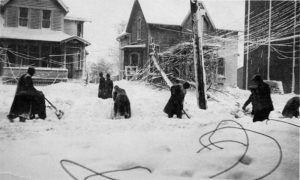
I found the language in “Alphinland” to be particularly compelling. I knew this would be true of Atwood’s writing from the very first line, “The freezing rain sifts down, handfuls of shining rice thrown by some unseen celebrant.” The italicized words, especially when spoken out loud, have a distinct cadence due to the repetition of -ing and the one syllable “i” words. There is even repetition in the -fts and -ce sound.
I think the elevated language and control of syntax is intentional because it lends to the character’s voice, who is an author herself. Even though the story is in third-person, it feels as if the the narrator’s voice and the character’s voice become one. On page two, the narrator describes the ending scene on the news as one with “a minor touch of pathos.” That is a description/observation on the narrator’s behalf, but also something that Constance would notice as an author. This creates a very intimate third-person experience. This is a story of blurred boundaries.
Constance spreads ashes on her walk as she leaves the house (page 8), and the ashes are used in Alphinland later (page 33). She acknowledges that she has alternate fates for those who wronged her in the Alphinland world (28), and this mirrors the complicated alternate truths in her real life. Ewan has died, but she can still speak to him. Did he have an affair, or not, and how does that information shape her life, as she has shaped the world of Alphinland?
Also, I think the snow storm setting is perfect. It isolates the character to deal with all of this, and as it takes place over the course of the night, there is a clean beginning and end.
